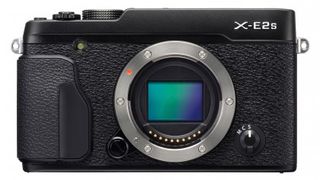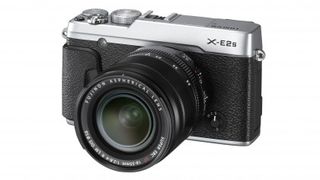TechRadar Verdict
While it doesn't offer some of the features of its competitors, the X-E2S is well designed and a pleasure to use. It's also sensibly priced and produces high quality images.
Pros
- +
Very good image quality
- +
Very good EVF
- +
Great noise control
Cons
- -
Shot-to-shot times could be better
- -
Needs a tilting/adjustable LCD
- -
Some rivals offer 4K video
Why you can trust TechRadar
Following the success of the then-flagship X-Pro1, Fuji introduced the X-E1 and X-E2 models as similar, but more affordable, alternatives for the enthusiast user. Now, along with the arrival of the X-Pro2 and X-70 compact, the company has also refreshed its X-E line with the X-E2S.
The X-E2S sits roughly in the middle of Fuji's X-series line-up, more advanced than the budget X-A2 and, to some extent, the similarly specified X-T10, but less so than the X-Pro2 and X-T1. As such, it's likely to appeal to those upgrading from junior models or seeking a backup for a more advanced camera. Its chief rivals from other manufacturers include the Olympus OM-D E-M10 II and the Panasonic Lumix GX8.

As the 'S' suffix suggests, the camera is not as significant a step forward from the X-E2 as the X-E2 was from the X-E1, but a number of changes have nevertheless been made. These include a revised autofocus (AF) system, with 77 points (up from 49) and new Zone and Wide/Tracking modes, while focusing speeds are said to have been improved, now as fast as 0.06sec (a 0.02sec improvement over the X-E2).
A new electronic shutter also joins the mechanical one; as well as allowing for shutter speeds as high as 1/32,000sec to be used this also provides a near-silent shutter operation, which may be handy when discretion is key. The camera also now offers a maximum (extended) ISO setting of 51,200 in the JPEG format, and also adds the Classic Chrome option to the Film Simulation modes and an Interval Timer, two features absent from the X-E2 upon launch but made available through a subsequent firmware update.
In terms of features, the rest of what the camera offers is essentially the same as the X-E2. For example, it uses the same acclaimed (if ageing) 16.3MP X-Trans CMOS II sensor, together with the EXR Processor II engine and X-series mount. The 2.36 million-dot electronic viewfinder is unchanged from the version inside the X-E2 (with recent firmware) as is the 3-inch 1.04 million-dot LCD screen on the rear – although changes have been made to the user interface.

The camera goes on to offer a collection of Film Simulation modes including Astia, Provia and Velvia, although the new black-and-white Acros option seen on the X-Pro2 is not present. Full HD video recording is on offer at a choice of frame rates up to 60p, with the further option of using an external microphone as an alternative to the camera's own.
Burst shooting at maximum resolution is once again possible at a rate of 7fps, although the burst depth has decreased from 28 JPEGs on the X-E2 to 18 frames here, while the Wi-Fi functionality that allows for image sharing and remote control from smart devices has been carried over.
In a move that will no doubt please X-E2 owners, Fuji has already released a firmware update that brings many of the X-E2S's advantages, such as the changes to the focusing system and the electronic shutter, to the X-E2.
Most Popular


